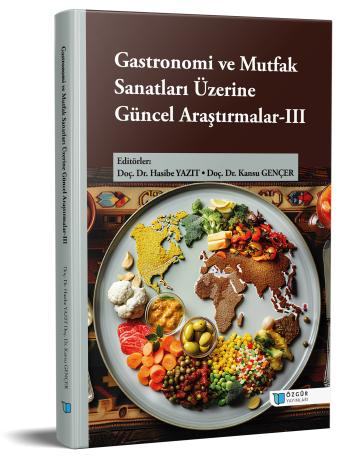
Gastronomy and Tourist Guidance
Chapter from the book:
Yazıt,
H.
&
Gençer,
K.
(eds.)
2024.
Current Research on Gastronomy and Culinary Arts-III.
Synopsis
Gastronomy tourism is developing rapidly nowdays and is accepted as one of the most creative and dynamic segments of tourism. Local cuisine gives destinations a competitive advantage, helps the destination to gain a unique identity and sustain local culture, and contributes greatly to the economy. Many countries compete fiercely with others to highlight their own culturally specific cuisine. Turkey is also in this competition through the efforts of various stakeholders such as food and beverage businesses, travel and hospitality businesses and some other relevant businesses and organizations such as government, media and academia. As a matter of fact, Turkish cuisine, which has a very long history, has an important place among the world cuisines, offers local, unique flavors to tourists in many destinations and has a great potential. Gaziantep (2015), Hatay (2017), Afyonkarahisar (2019), Kayseri (2021), Adana (2021), Nevşehir (2023) and Tokat (2023) are among the cities in the gastronomy network (www.unesco.org.tr). Developments such as the increase in the number of qualified chefs as a result of the gastronomy education given in public and private universities, the increase in the number of cities in the UNESCO Creative Cities gastronomy network every year, and the increase in the number of Michelin-starred restaurants and chefs lead to the emergence of gastronomy routes. Therefore, tours will be organized to explore these routes and specialized tourist guides will be needed. For this reason, it is very necessary to encourage tourist guides specialized in gastronomy. The fact that a city has an important potential in gastronomy tourism is not enough for a destination to become a trend. If tourists visiting a region for eating and drinking are not given information about the philosophy and history of the food and beverage items, the trip will be incomplete. In this respect, the tourist guide service can be considered as an incentive for those who want to have new and different experiences. For this purpose, it imposes new responsibilities on tourist guides who have many responsibilities. First of all, the tourist guide is expected to know both his/her own culture and the culture of the tourist closely. Thus, he/she can transfer the national food culture to the tourist and help him/her have a new experience and make sense of this experience.

